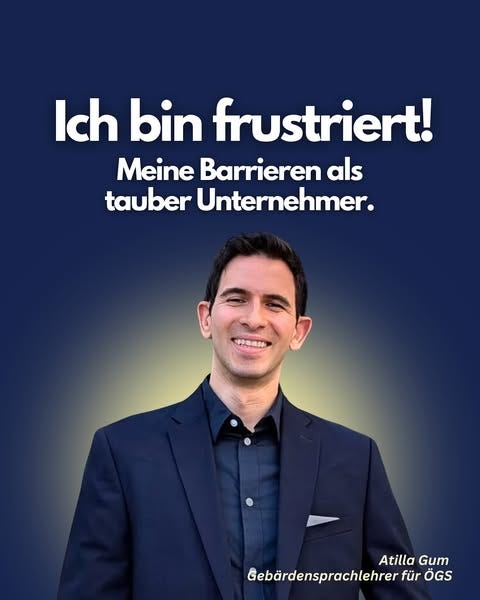Video Description
Atilla is standing outdoors in a quiet, green park. Tall trees and bushes surround him, with sunlight softly filtering through the leaves and casting light patches on the grass. A large tree trunk is visible behind him.
He wears a brown short-sleeved T-shirt, light pants, and a silver wristwatch on his left wrist. His medium-length dark hair is combed back, and he wears subtle glasses with transparent frames.
Atilla stands upright, facing the camera, signing in International Sign (IS). His signing is calm, fluent, and expressive, using clear hand movements, facial expressions, and body language. He occasionally makes eye contact with the camera, showing a serious, friendly, and engaged expression. The background stays still and natural throughout the video.
Atilla Gum
Atilla Gum is an Austrian sign language educator and Deaf entrepreneur. I may be biased, as his student, but he is great at it!
He believes that sign language education should be accessible to all, so he not only teaches at Witaf — the oldest association in Vienna dedicated to promoting the full and inclusive participation of deaf and hard-of-hearing people — and MetaLab, but he also publishes full recordings of his A1 courses on YouTube.
If you can, consider donating to fund Atilla’s first year at Gallaudet!
Gallaudet University is the world’s only liberal arts university for Deaf and hard-of-hearing students.
The university’s executive leadership team is predominantly deaf. Including President Cordano as well as the chief of staff, the chief academic, the bilingual, the communications, and the undergraduate admissions, and the financial, the legal, and the operating officers. The dean of student affairs and the Clerc Center chief academic officer are also deaf. The majority of executive-level appointees are women. This ensures that the university’s leadership closely resembles the student body.
But this hasn’t always been the case. You may know Gallaudet from the recently released film Deaf President Now! The documentary follows the 1988 student protests at Gallaudet University.
When the film was first released, Reframing Disability wrote a great piece contextualizing it:
“We couldn’t accept a leader who didn’t understand our world.”
To give you some background about the DPN movement: Gallaudet University, established in 1864, was led by hearing presidents for 124 years—leaders who often had minimal understanding of Deaf culture or sign language. In 1988, when the university’s Board of Trustees selected a hearing candidate over two qualified Deaf finalists, the campus community knew it was time for change.
The Deaf community at Gallaudet gathered together, united by a powerful belief: “We couldn’t accept a leader who didn’t understand our world.” That sentiment became the heartbeat of the movement. Students, faculty, staff, and alumni organized a historic eight-day protest, shutting down the campus and capturing national attention. Their determination paid off—Dr. I. King Jordan was appointed as Gallaudet’s first Deaf president in 1988. Since then, the university has continued to be led by Deaf presidents, marking a turning point not only in Gallaudet’s history but in the global Deaf rights movement.
from Reframing Disability
Why Atilla chose Gallaudet
Atilla has been an entrepreneur for over 8 years. He had considered Gallaudet in the past, but initially dismissed the idea because he didn’t see himself in the social studies offered at the time. While he completed formal education to facilitate sign language courses, no economics course available in Vienna piqued his interest so far.
Atilla regularly teaches Austrian Sign Language at the United Nations (UN) in Vienna and occasionally gives workshops and talks on Deaf culture and inclusion. One of the UN's Disability Inclusion Network members connected him with a Gallaudet student who was completing an internship at the UN in Vienna.
This chance connection changed everything.
When they first met back in September 2024, she asked what he was studying. He replied that he was an entrepreneur, but faced many barriers in running his business. She encouraged him to consider studying at Gallaudet, as it now offers a Business Administration program too.
They looked it up together, registered, submitted his application, and by the end of May, he was accepted!
Atilla is especially excited about the Gallaudet Innovation & Entrepreneurship Institute (GIEI), which regularly organizes events for Deaf entrepreneurs, creating space for networking, knowledge sharing, and mutual support. With over 100 members, this flourishing community left a deep impression on him.
“I melted,” he said. “I absolutely want to be part of this!”
Gallaudet Innovation and Entrepreneurship Institute (GEIE)
GIEI is the only university-based entrepreneur program in the world for individuals who are deaf.
The GIEI network was what won Atilla’s heart. In Austria, Deaf entrepreneurship remains rare, and Atilla wants to change that. When I asked within my own network how the situation is in the EMEA (Europe, Middle East, Africa) market, responses were minute.
Deaf entrepreneurs face many barriers, so much so that Atilla wrote about it (in German) for Gebärdenverse on Instagram:
“I’ve been self-employed since 2017 and run my own business. I offer courses in Austrian Sign Language and raise awareness about Deafness and sign language. I want to be able to do much more. Barriers block my opportunities.”
“These barriers are exhausting and drain so much of my energy. But I want to use that energy for other projects.”
“Too often, I’ve had to fight conflicts in collaborations because inclusion was denied. Even support services turned me away, just because I’m Deaf. They said I couldn’t be self-employed.”
“One major problem: the lack of willingness to truly act inclusively.
Too often, it's just a show for the public.”
“At one consultation, they didn’t organize an interpreter. They tried to communicate with pen and paper, but kept speaking anyway. They said it was ‘too much effort’ to communicate differently.”
“It’s often hard to find interpreters. I adjust my schedule to their availability, but sometimes, there’s no one. Then I have to postpone. That means: no job, no income.”
“Deaf entrepreneurs need fair conditions.”
Follow Atilla on Instagram, YouTube, LinkedIn, or visit his website for work inquiries. If you can, consider donating to fund Atilla’s first year at Gallaudet:








Share this post